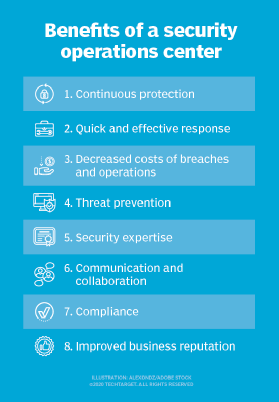8 benefits of a security operations center
A security operations center can help lessen the fallout of a data breach, but its business benefits go much further than that. Here are eight SOC benefits to consider.
A security operations center, or SOC, is one of the first lines of defense against attacks and breaches. The infosec employees working within this command center create, implement and revise an enterprise cybersecurity program, as well as deploy, manage and update the security technologies and tools key to preventing data loss.
The 2020 Verizon Data Breach Investigations Report categorized nearly 4,000 breaches in 2019, double the number from 2018. And, while Risk Based Security found the number of incidents in the first half of 2020 was down, the number of records exposed was more than four times higher than ever previously reported in the same time period.
Whether the SOC is located in-house, in the cloud or virtually, or staffed internally, outsourced or a mix of both, it may mean the difference between preventing a breach and a company shuttering its doors.
Here are the top eight benefits of a security operations center.
1. Continuous protection
Security operations centers run 24/7 year-round. This uninterrupted monitoring is critical to detecting the first signs of anomalous activity. Attacks don't only occur Monday through Friday, 9 to 5. SOC team members -- whether in-house, hired or virtual -- monitor for potential vulnerabilities around the clock to catch threats at all hours.
2. Quick and effective response
Because SOC team members continuously monitor for threats, they decrease the amount of time elapsed between when the compromise first occurred and mean time to detection. Should anomalous activity be detected, SOC analysts investigate and verify the event is indeed an attack before working to contain it. The SOC team then begins incident response to determine the severity of the threats, eradicate them and remediate any ill effects.

3. Decreased costs of breaches and operations
By minimizing the amount of time a cyber attacker lurks in an enterprise's network, the SOC team can reduce the effect of a breach and, therefore, the potential costs the breach may incur via data loss, lawsuits or business reputation damage. The longer an attacker remains in a system, the more potential damage can be done to the company.
In addition, SOC teams work diligently to minimize downtime and business disruption during an attack to prevent monetary losses.
In terms of operations, having a centralized SOC team can lower Capex and Opex. Security experts working on a streamlined team also prevent multiple groups or departments from duplicating efforts by working on the same cybersecurity incidents.
The SOC itself can also be a source of cost savings. Outsourcing tasks to managed security service providers, cloud service providers or virtual SOCs can offload some or all security responsibilities to eliminate the need for a dedicated SOC facility and staff.
4. Threat prevention
SOCs are about more than just detecting incidents. The analysis and threat hunting conducted by SOC teams help prevent attacks from occurring in the first place. SOCs provide increased visibility and control over security systems, enabling the organization to stay ahead of potential attackers and issues.
5. Security expertise
A security operations center often consists of a SOC manager, incident responder and security analyst(s), as well as other specialized positions, such as security engineers, threat hunters, forensic investigators and compliance auditors. Each of these employees has a diverse set of skills, which, when combined with those of other SOC employees, is instrumental to detect, remediate, analyze and learn from threats.
Team members also have broad knowledge of tried-and-true technologies for threat detection and prevention, such as SIEM, Behavioral threat analytics, AI and machine learning, and cloud access security brokers, as well as the most advanced threat detection techniques.
6. Communication and collaboration
A SOC team is well versed in communication and collaboration -- not only within the team itself, but also with the organization as a whole. SOC team members educate employees, third-party contractors, clients and more about potential threats through security awareness training programs. Security operations center team members also share security insights with C-level executives and management, business leaders and department heads to help company leaders calculate potential risks to evaluate if the risks should be accepted or if a new policy or control should be adopted to mitigate them.
7. Compliance
Key SOC monitoring capabilities are integral to enterprise compliance, especially following regulations that require particular security monitoring functions and mechanisms, such as GDPR and CCPA.
8. Improved business reputation
Having a SOC is an indicator to employees, clients, customers and third-party stakeholders that the company takes data security and privacy seriously. This helps the business, employees and customers feel more comfortable sharing data. And the more seriously a company takes the security and privacy of its data, the greater trust it will earn from its constituents. The improved business reputation from a well-run SOC can potentially increase recommendations from current clients and prospective ones.







